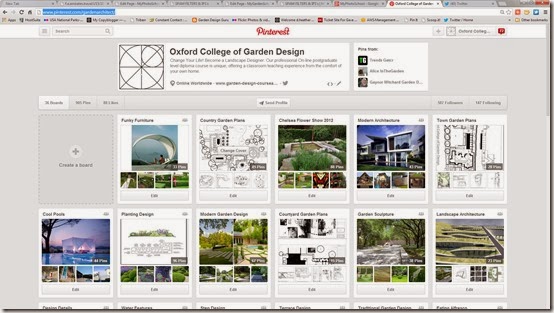How Pinterest is replacing traditional media and how we as designers can use it to help both us and our clients define their sense of style.
I used to tell my design students to subscribe to various magazines for inspiration, primarily to help develop their sense of style, something I used to call ‘their internal design library’. Magazines like Architectural Digest, Garden Design, House & Garden, Gardens Illustrated and Sunset Magazine where good examples, but not any more! Today all they need is Pinterest
I would go so far as to suggest that Pinterest is almost singlehandedly putting the final nail in the coffin of the magazine industry if my wife Carol is anything to go by.
Pinterest has become the go-to tool people use to plan their future— from what they’ll make for dinner this week, to where to go and what to see on their next vacation. To use Pinterest successfully for your business, you need to think about the interests your business has in common with your customers.
For an interior designer, it might be photographs of beautiful rooms. For an architect it might be building styles, or design detailing. For a lighting company, it might be images of stunningly lit interiors and for the landscape designer, it’s likely helping people discover the garden of their dreams.
Whatever the interest, people tend to pursue them through four stages: aspiration, anticipation, participation and reflection.
- 1. Aspiration: the moment you get inspired to pursue a specific interest (i.e. thinking of remodelling a room or garden)
- 2. Anticipation: the phase where people look into the interest and start prepping to actually do it (i.e. researching supplies).
- 3. Participation: when people actually participate in the interest they’ve decided to pursue (shortlisting and ordering)
- 4. Reflection: where people reflect on the finished result, maybe by taking a photo and sharing it on a social network.
Pinterest is most often used in the first three stages, and the most successful businesses use it to help clients and potential customers along the journey.
Pinterest can replace the designers ‘Mood Board’ by creating an interactive online version, where both client and designer can collaborate to producing a pin board that truly reflects everyone’s ideas and aspirations for a project.
For the first time Pinterest has allowed people to define their style in public. My wife is a classic example. (http://www.pinterest.com/carolfheather/) She used to subscribe to more than a dozen glossy magazines and has now cancelled all but three, because she is able to get all the eye candy she needs from Pinterest.
When creating and curating inspiring content, make sure you write thoughtful Pin and board descriptions so people can find what they’re looking for.
From a business point of view, marketing on Pinterest isn’t about bombarding people or blasting them with brand messages. It’s about identifying how your business fits in with the viewing person’s interests and becoming part of how they pursue and participate in that interest. The businesses that achieve this are bound for Pinterest success.
Technorati Tags: Pinterest, Design, Interior, Landscape, Garden, Architecture, lighting, aspiration, anticipation, participation,

No comments:
Post a Comment
Note: Only a member of this blog may post a comment.